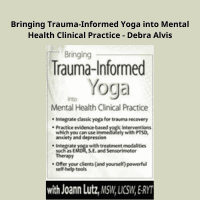Course Content Summary:
This comprehensive course, led by the esteemed Debra Alvis, bridges the gap between the principles of trauma-informed care and the therapeutic applications of yoga. Participants will gain a deep understanding of how trauma impacts the body and mind, and learn practical, evidence-based yoga techniques to support healing and resilience in their clients.
Target Audience:
This course is designed for a wide range of mental health professionals, including:
- Psychologists
- Psychotherapists
- Counselors
- Social Workers
- Psychiatric Nurses
- Other allied mental health practitioners
Key Learning Outcomes:
Upon completion of this course, participants will be able to:
- Understand the neurobiological impact of trauma and its manifestation in the body.
- Apply the core principles of trauma-informed care within a yoga framework.
- Adapt yoga postures, breathing techniques (pranayama), and meditation practices to be safe and effective for individuals with trauma histories.
- Recognize and respond to trauma-related responses during yoga sessions.
- Integrate somatic awareness and interoception into therapeutic interventions.
- Develop skills in creating a safe and empowering therapeutic environment.
- Understand the ethical considerations of offering yoga within a mental health context.
- Learn specific yoga sequences and modifications for common trauma-related symptoms such as anxiety, depression, and hypervigilance.
- Explore the role of yoga in fostering self-regulation, body awareness, and a sense of agency in clients.
Course Modules (Based on potential content):
- Module 1: Understanding Trauma and the Nervous System: An overview of different types of trauma and their impact on the brain and body.
- Module 2: The Principles of Trauma-Informed Care: Exploring safety, trustworthiness, collaboration, empowerment, and cultural humility in the context of yoga.
- Module 3: The Mind-Body Connection in Trauma Healing: Understanding interoception, proprioception, and somatic experiencing.
- Module 4: Adapting Yoga Asana for Trauma Sensitivity: Modifications, variations, and the use of props to create safety and choice.
- Module 5: The Power of Breath (Pranayama) in Trauma Recovery: Safe and effective breathing techniques to regulate the nervous system.
- Module 6: Mindfulness and Meditation for Trauma: Cultivating present moment awareness and grounding techniques.
- Module 7: Creating a Safe and Therapeutic Space: Considerations for language, touch, and environmental factors.
- Module 8: Ethical Considerations in Trauma-Informed Yoga: Boundaries, consent, and professional responsibility.
- Module 9: Integrating Yoga into Clinical Practice: Practical strategies and case examples.
- Module 10: Self-Care for the Clinician: Maintaining well-being while working with trauma.
Empower your clinical practice with trauma-informed yoga tools. Enroll now and support your clients’ healing through mind-body integration!
SIGN UP NOW







